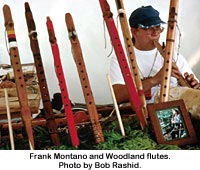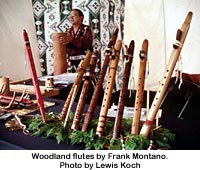|
Home | Search | The Artists | Teaching | Hiring | About This Site | Contact Us |
||

Frank Montano’s |
Woodland Flutes
Cedar is the best wood for making Woodland flutes. Tribes in other parts of the country make their flutes from redwood, willow or hardwoods like walnut, maple or apple. Soft woods like cedar make flutes that have a mellow tone and hard woods make flutes with a shriller sound. Woodland flutes have six evenly spaced holes and all the holes are the same size. Each person who makes a flute decides how close to place the holes and how large to make the flute. Usually Woodland flutes are about two feet long. On some flutes, for decoration, the maker carves the open end in the shape of a bird’s or other animal’s head. Woodland flute players blow air from the end, not from the side like the flutes that are played in symphony orchestras. End-blown Woodland flutes are called “fipple” flutes because the fipple is what produces the sound. To play a Woodland flute, Frank blows air through the mouthpiece into a “focusing channel” or “wind way” in the barrel of the flute. The air passes a rectangular sound hole. A wooden block,
usually carved in the shape of a bird or some other animal, is tied to the flute with a piece of buckskin so that the bottom front of the block is lined up When Frank plays his flutes, the notes he plays express the thoughts in his mind. This is a kind of musical improvisation. Frank seldom plays a piece of music note for note in the exact same way because he likes to improvise. |
For Educators: |
|
“Spirits fill my nights with dreams – lyrics by Frank Montano |
||
|
Home | Search | The Artists | Teaching | Hiring | About This Site | Contact Us |
||


 with
the back of the sound hole. You can see those blocks in these flutes of Frank’s.
with
the back of the sound hole. You can see those blocks in these flutes of Frank’s.